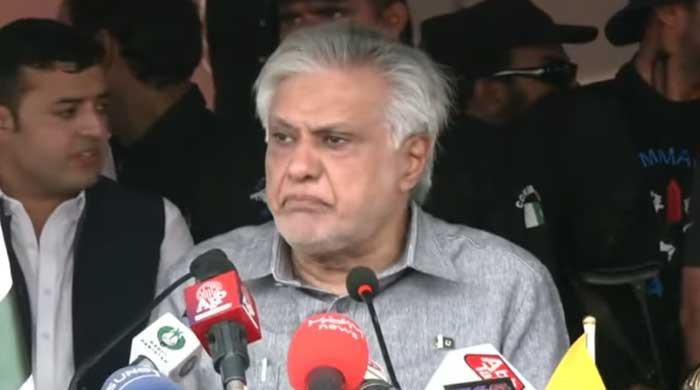Ishaq Dar Expresses Concerns Over Potential Changes in Jammu and Kashmir’s Status
Deputy Prime Minister and Foreign Minister Ishaq Dar voiced apprehension regarding the Modi administration’s potential strategy to reinstate statehood for Jammu while upholding the union territory designation for occupied Kashmir.
He made these remarks during an address at a rally held in connection with Youm-e-Istehsal, commemorating the sixth anniversary of New Delhi’s revocation of the semi-autonomous status of Indian Illegally Occupied Jammu and Kashmir (IIOJK). The rally proceeded from the Foreign Office to D-Chowk in Islamabad on Tuesday.
Referring to reports in the Indian media, Dar stated that on August 5, 2019, Jammu and Kashmir and Ladakh were designated as union territories, but now there are indications that Jammu might be granted statehood.
The deputy prime minister suggested that an announcement on this matter could occur in the coming hours or days.
He mentioned that under this speculated plan, occupied Kashmir would continue to be a union territory. He condemned this prospect as unacceptable and provocative.
Reports in Indian media suggest that recent meetings between the Indian president, Prime Minister Narendra Modi, and Home Minister Amit Shah have ignited speculation that the government in New Delhi may initiate the restoration of statehood to the occupied region.
This development occurred as the Indian Supreme Court prepares to hear a petition on Friday (August 8), seeking directives for the central government to restore statehood to IIOJK.
Addressing the rally, Dar urged India to rescind all unlawful actions implemented on August 5, 2019, cease its oppressive measures in IIOJK, and end the media blackout in the region.
He affirmed that Pakistan will persist in providing diplomatic, political, and moral support to the Kashmiri people until their inherent right to self-determination is fulfilled.
He stressed that the Kashmir issue is an internationally recognized dispute, and its resolution cannot be achieved through internal legislation or judicial pronouncements.
The foreign minister restated Pakistan’s commitment to peaceful coexistence, emphasizing that this dedication to peace should not be interpreted as weakness. He conveyed Islamabad’s desire for amicable relations with all neighboring countries and its preference for dialogue and diplomacy over confrontation.
Dar cautioned, however, that Pakistan’s armed forces and its populace are fully prepared to deliver a strong response to any act of aggression, as exemplified during Marka-e-Haq—the Pakistan Army’s designation for the period of conflict with India from the April 22 Pahalgam attack to the May 10 conclusion of Operation Bunyan-um-Marsoos.



Comments (0)
No comments yet. Be the first to comment!
Leave a Comment